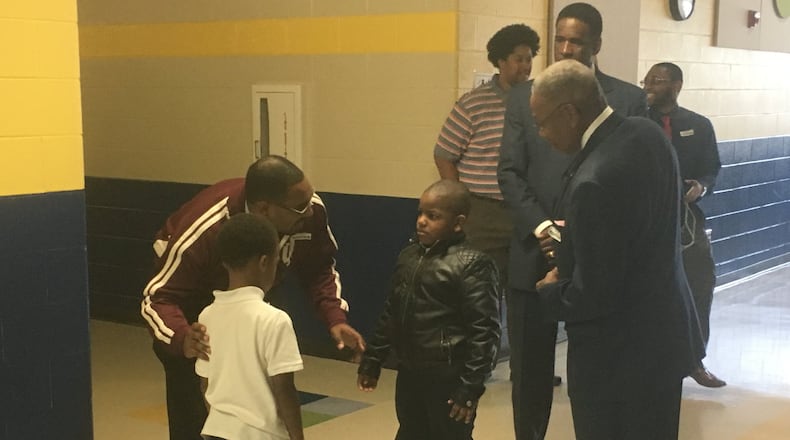“The responsibility for each of you is to look for positive role models, to take yourself to the next level,” Mims said, while celebrating students who had perfect attendance. “When you come to school every day and do the best you can, your grades will go up, your learning potential goes up. You reinforce your talent, your skill.”
Some of the two dozen volunteers who visited the school acknowledged the challenges many students face. When Will Smith of the Miami Valley Organizing Collaborative asked how many students knew someone who had been in jail, nearly every had went up.
“If we have somebody in our family locked up, or going through something bad, we learn from it; we learn by example,” Smith said.
He asked the students, “Do we do the same things that got them there?” with students shouting “No!” He followed up, “Does this mean we love them any less?” and most students again said “No.”
Several speakers were very clear with the young students that they had a choice of paths — one leading to a high school diploma plus college or a career, and the other leading to the streets and eventually jail or death.
Julius Ruby Sr. made the students repeat his inmate number from the time he spent in prison. He told them he landed there because of his own choices, and urged them to follow the motto, “Live with honor,” starting immediately.
Many of the students were quickly on board. When City Commissioner Joey Williams asked them what they could do to help themselves, there were quick answers of “stay in school, work as hard as you can, get good grades, and never give up.”
The issues weren’t always so serious. Richard Jones, who works at Wright-Patterson Air Force Base, worked with two very young students who were arguing and pushing in the lunch line.
“I saw that they were upset, but I wanted them to understand, everything doesn’t have to be violence-based,” Jones said. “You can sit down and talk about it. Make them see there’s another way out.”
Gerard Williams II told a group of students that their education would serve as the foundation of their lives, just like the foundation of a house. One bright student quickly suggested they needed a blueprint first, leading to the message that wanting to succeed is one thing, but making a plan helps you get there.
The citywide Men of Color group works with Dayton Public Schools’ relatively new Office for Males of Color, which is trying to increase academic performance and attendance, mainly among black male students.
Local activist Marlon Shackelford summed up a message to the kids.
“School is your job and you can’t afford to be fired,” he said. “Nobody wants a dummy but the streets, the prisons and the cemetery. Do you know who you can be? What you want to be? If you try to be?”
About the Author

